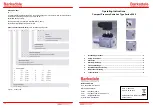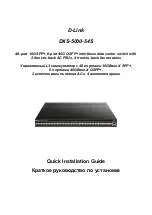
Example of Client-Based SSH Authentication
Dell#ssh 10.16.127.201 ?
-c Encryption cipher to use (for v2 clients only)
-l User name option
-m HMAC algorithm to use (for v2 clients only)
-p SSH server port option (default 22)
-v SSH protocol version
Troubleshooting SSH
To troubleshoot SSH, use the following information.
You may not bind
id_rsa.pub
to RSA authentication while logged in via the console. In this case, this message displays:
%Error: No
username set for this term.
Enable host-based authentication on the server (Dell Networking system) and the client (Unix machine). The following message appears if
you attempt to log in via SSH and host-based is disabled on the client. In this case, verify that host-based authentication is set to “Yes” in
the
file ssh_config
(root permission is required to edit this file):
permission denied (host based).
If the IP address in the RSA key does not match the IP address from which you attempt to log in, the following message appears. In this
case, verify that the name and IP address of the client is contained in the
file /etc/
hosts:
RSA Authentication Error
.
Telnet
To use Telnet with SSH, first enable SSH, as previously described.
By default, the Telnet daemon is enabled. If you want to disable the Telnet daemon, use the following command, or disable Telnet in the
startup config. To enable or disable the Telnet daemon, use the
[no] ip telnet server enable
command.
The Telnet server or client is VRF-aware. You can enable a Telnet server or client to listen to a specific VRF by using the
vrf vrf-
instance-name
parameter in the
telnet
command. This capability enables a Telent server or client to look up the correct routing table
and establish a connection.
Example of Using Telnet for Remote Login
Dell(conf)#ip telnet server enable
Dell(conf)#no ip telnet server enable
VTY Line and Access-Class Configuration
Various methods are available to restrict VTY access in Dell Networking OS. These depend on which authentication scheme you use —
line, local, or remote.
Table 65. VTY Access
Authentication Method
VTY access-class support?
Username access-class
support?
Remote authorization support?
Line
YES
NO
NO
Local
NO
YES
NO
YES
NO
YES (with Dell Networking OS
version 5.2.1.0 and later)
RADIUS
YES
NO
YES (with Dell Networking OS
version 6.1.1.0 and later)
Dell Networking OS provides several ways to configure access classes for VTY lines, including:
•
VTY Line Local Authentication and Authorization
Security
723
Summary of Contents for S3048-ON
Page 1: ...Dell Configuration Guide for the S3048 ON System 9 11 2 5 ...
Page 137: ...0 Gi 1 1 Gi 1 2 rx Flow N A N A 0 0 No N A N A yes Access Control Lists ACLs 137 ...
Page 142: ...Figure 10 BFD Three Way Handshake State Changes 142 Bidirectional Forwarding Detection BFD ...
Page 241: ...Dell Control Plane Policing CoPP 241 ...
Page 287: ... RPM Synchronization GARP VLAN Registration Protocol GVRP 287 ...
Page 428: ...Figure 53 Inspecting the LAG Configuration 428 Link Aggregation Control Protocol LACP ...
Page 477: ...Figure 73 Configuring Interfaces for MSDP Multicast Source Discovery Protocol MSDP 477 ...
Page 478: ...Figure 74 Configuring OSPF and BGP for MSDP 478 Multicast Source Discovery Protocol MSDP ...
Page 483: ...Figure 77 MSDP Default Peer Scenario 2 Multicast Source Discovery Protocol MSDP 483 ...
Page 484: ...Figure 78 MSDP Default Peer Scenario 3 484 Multicast Source Discovery Protocol MSDP ...
Page 745: ...Figure 104 Single and Double Tag TPID Match Service Provider Bridging 745 ...
Page 746: ...Figure 105 Single and Double Tag First byte TPID Match 746 Service Provider Bridging ...
















































